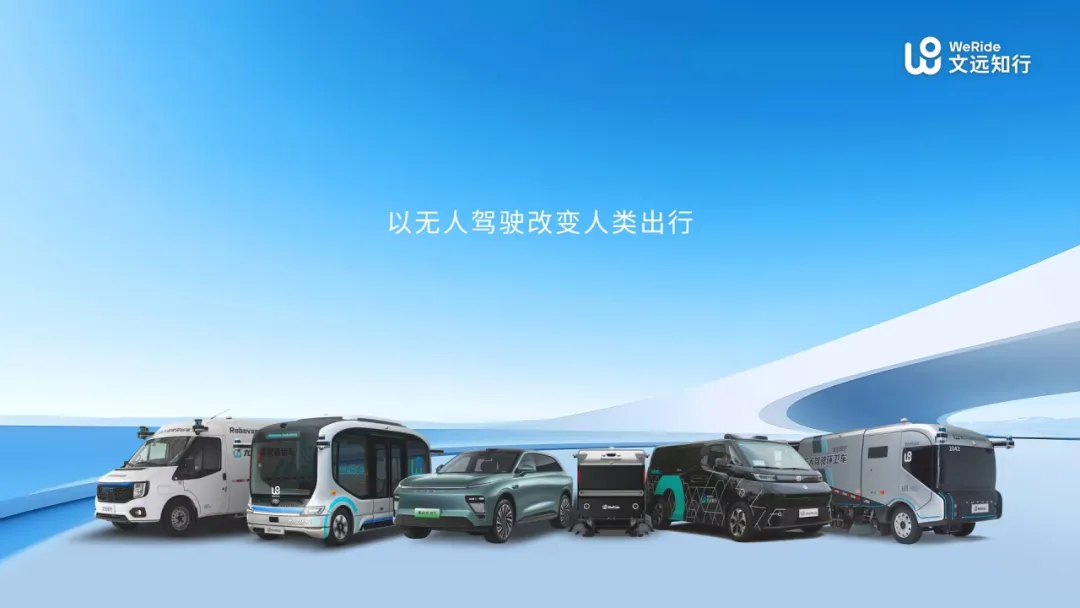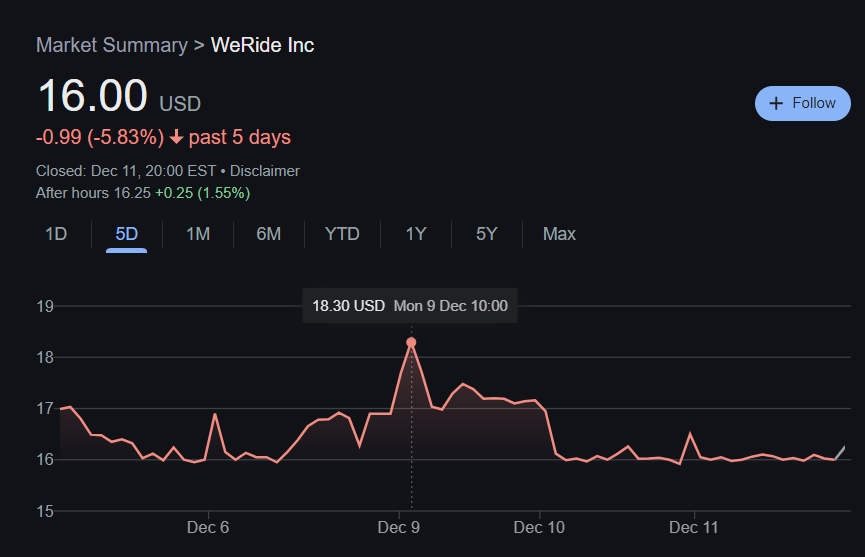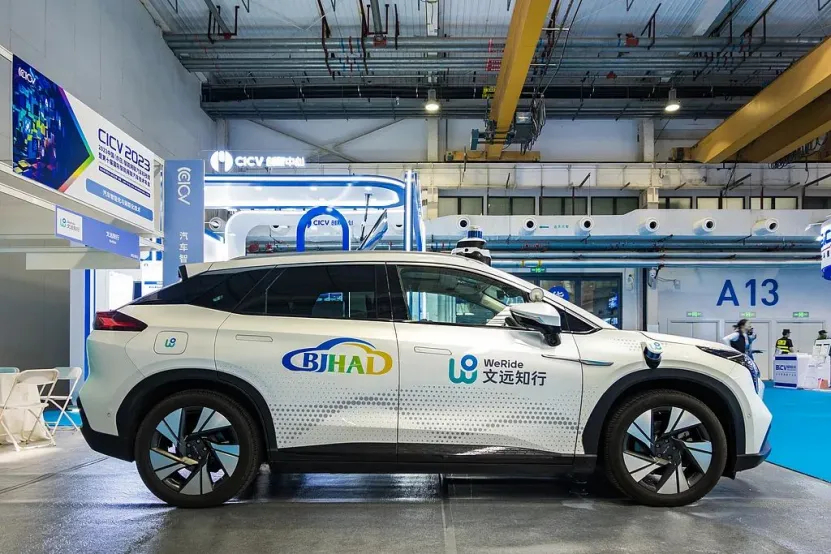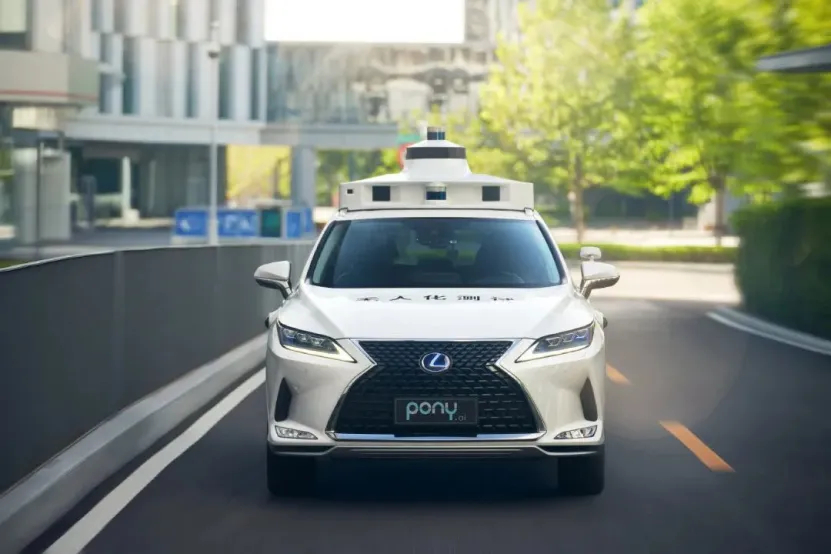Guangzhou's WeRide Breaks Through as a Super Unicorn with NASDAQ IPO!
On October 25, Beijing time, Guangzhou-based WeRide officially listed on NASDAQ, becoming "the first global universal autonomous driving stock" and the world's first "Robotaxi" (self-driving taxi) stock.
On October 25, Beijing time, Guangzhou-based WeRide officially listed on NASDAQ, becoming "the first global universal autonomous driving stock" and the world's first "Robotaxi" (self-driving taxi) stock. In this initial public offering (IPO), the company's share price was set at $15.50 each, with a total valuation of $5.3 billion (approximately 38 billion RMB, based on fully diluted shares). This marks one of the largest IPOs of a Chinese company in the U.S. this year.
Seven Years of Crafting the Sword
Founded in 2017, WeRide was one of the pioneers in the development and commercialization of autonomous driving technology. In just seven years, the company has risen to become one of the world's leading autonomous driving enterprises. In the 2024 Global Unicorn List, WeRide ranked 157th with a market value of $35.5 billion.
As a global leader in autonomous driving technology, WeRide is the only technology company in the world with autonomous driving licenses in China, the United States, the UAE, and Singapore. The company is committed to developing safe and reliable self-driving technology and has already launched research, testing, and operations in 30 cities across seven countries. Its commercial applications span smart mobility, smart logistics, and innovative sanitation, forming a product matrix that includes autonomous taxis, autonomous minibusses, autonomous trucks, autonomous sanitation vehicles, and high-level intelligent driving solutions.

Compared to its peers in the autonomous driving industry, WeRide's core competitiveness lies in its diversified commercialization scenarios and its global footprint. The company's autonomous vehicles and advanced intelligent driving solutions cover three major commercial fields—smart mobility, smart logistics, and innovative sanitation. These diversified applications provide strong support for the company's ability to generate continuous revenue.
As China's only company with nearly five years of experience in Robotaxi commercial operations, WeRide has not only expanded its testing and operational range domestically but has also brought its products, technologies, and business models to the Middle East, Southeast Asia, and Europe, becoming one of China's most prominent autonomous driving technology brands abroad. Thanks to its strategic advantage of diversified commercial scenarios and global deployment, WeRide has maintained strong market competitiveness, placing its revenue among the top in the global autonomous driving industry.
In an interview with Hurun Report, WeRide founder and CEO Han Xu stated that the company will continue to follow the principles of productizing technology and commercializing products. It will pursue a development strategy centered around one central platform, three significant scenarios, and five key products while fostering more communication and cooperation with upstream and downstream partners to enhance its brand, technology, products, and business model abroad.
Attracting Investment from Multiple Sources
On its first trading day, WeRide's stock surged sharply, triggering two halts due to the rapid rise. It reached a peak increase of 27%. By the end of the day, its stock price had climbed 6.77%, closing at $16.55.

WeRide's entrepreneurial journey mirrors a V-shaped trajectory: rapid development in its early stages, followed by a brief period of stagnation, and then a strong rebound. In the early years, WeRide leveraged its first-mover advantage and the support of prominent technological figures to achieve significant progress. Within just 81 days of its founding, WeRide conducted its first public road test for autonomous driving. In just five months, the company raised $57 million in its Pre-A round and, six months later, established China's first operational autonomous vehicle fleet in Guangzhou—an impressive growth rate.
With the support of capital markets, WeRide has completed several rounds of financing, attracting the attention of numerous top-tier investment institutions. According to data from Tianyancha, WeRide has raised funds through at least six rounds, with notable investors including Qiming Venture Partners, IDG Capital, and Sequoia Capital. The company has also attracted substantial investment from industry giants such as GAC Capital and Bosch, as well as personal investments from individuals like He Xiaopeng, the chairman of XPeng Motors.

In its latest round of financing, GAC Group, through its wholly-owned subsidiary GAC Capital, announced an investment of up to $20 million in WeRide, providing substantial financial support for the company's development. This series of investments reflects the market's high recognition of WeRide's potential in the autonomous driving sector.
The IPO prospectus shows that the funds raised will be used for research and development of autonomous driving technologies, products, and services, as well as the commercialization of autonomous fleets, capital expenditures, and working capital.
According to Kuang Ziping, the founder and managing partner of Qiming Venture Partners, WeRide's success can be attributed to several factors:
- A firm belief in the vision of autonomous driving led the company to continue developing its technology despite skepticism.
- It focuses on survival during its growth phase and takes a diverse approach to revenue generation, exploring various avenues such as Robotaxi, Robobus, Robovan, Robosweeper, and ADAS.
- The company's strong execution since its founding.
CMC Capital managing partner Chen Xian also commented, "WeRide's listing not only affirms its technical capabilities and market position but also represents the internationalization process of Chinese autonomous driving companies, especially in the areas of application, technology export, and commercial model expansion. With its strong R&D team, market expansion ability, and forward-thinking commercialization strategy, WeRide has become a benchmark in the industry. We believe that post-listing, WeRide will attract even more recognition and resources, propelling sustainable development and driving new momentum for the autonomous driving sector."
The Rise of Autonomous Driving IPOs
The Chinese autonomous driving industry is entering a new phase.
This year has seen a surge in the number of autonomous driving companies going public, with many companies racing to be the first in their respective sub-sectors. WeRide's IPO marks its leadership in the Robotaxi market.

In July, Qichi Mobility was listed on the Hong Kong Stock Exchange, earning the title of "the first autonomous driving operation technology stock." In August, Black Sesame Technologies, an autonomous driving chip company, also went public in Hong Kong, earning the title of "the first smart automotive AI chip stock." On October 24, Horizon Robotics, an intelligent driving technology company, went public on the Hong Kong Stock Exchange, raising 5.407 billion HKD, marking the most significant technology IPO in the Hong Kong market this year.
Several other companies are also preparing for IPOs. On October 18, autonomous driving company Pony.ai filed its IPO prospectus with the U.S. Securities and Exchange Commission (SEC), planning to list on NASDAQ. Other companies such as Momenta, Xijing Technology, and Zongmu Technology, covering various fields like smart driving chips, lidar, and autonomous driving solutions, are also in line for listing.
Like WeRide, Pony.ai is actively pushing forward with Robotaxi commercialization. According to publicly available data, Pony.ai has already completed over 33.5 million kilometers of autonomous driving test mileage, including nearly 4 million kilometers of fully driverless tests. According to filing information with the China Securities Regulatory Commission, Pony.ai plans to issue up to 98.15 million common shares.
With Robotaxi now piloting in multiple cities and the vehicle-road-cloud integration receiving strong policy support, industry analysts predict that the autonomous driving sector is about to enter a new growth phase.
It is forecasted that Robotaxi services will be commercially available by around 2026. The global market is expected to reach $290 million by 2025 and grow to $66.6 billion by 2030. China is poised to become the largest Robotaxi market globally, with projected market sizes of $200 million in 2025 and $39 billion in 2030.
There is confidence that high-level autonomous driving is accelerating toward commercialization, entering a new stage in terms of regulations, technology, and capital operations. After several years of development and accumulation, the industry is poised for explosive growth.

Han Xu, the founder and CEO of WeRide, concluded: "Seven years of hard work and persistence have led to today's WeRide, and we are ready for our next journey. We sincerely thank our investors, customers, employees, and all partners for their trust and support! Together, we have reached this important milestone. Going public marks a new starting point for us. WeRide will continue to innovate in technology and bring safe, comfortable, and convenient autonomous driving products and services to more countries and regions."








